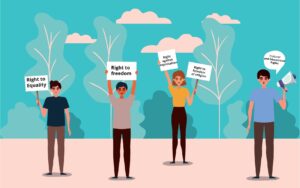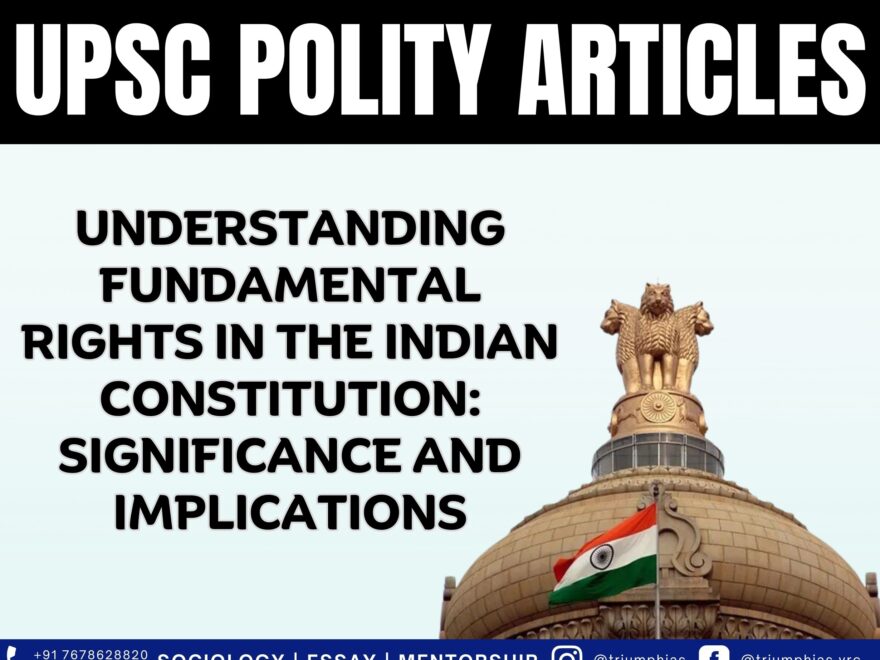Fundamental rights
(Relevant for Polity section of General Studies Paper Prelims/Mains)

Fundamental Rights (FRs) refer to those rights guaranteed directly by the constitution itself, such as the Right to Equality, Right to Freedom, and Right against Exploitation, among others. These rights are crucial for ensuring the holistic development of individuals. In cases where these rights are violated, individuals have the option to seek recourse through the Supreme Court or the High Court to reinstate them.
The Indian Constitution addresses Fundamental Rights in Articles 12-35, emphasizing their inviolable nature for the citizens of India. These human rights, including the Right to Life, Right to Dignity, and Right to Education, are categorized under the umbrella of six primary fundamental rights.
In ancient times, the focus primarily leaned towards the concept of justice rather than individual rights.
BACKGROUND
- The concept of rights entitlement can be traced back to the “Magna Carta” of 1215.
- Human rights are conceptualized as abstract principles rooted in religious and moral philosophies.
- The act of codifying and enumerating these rights facilitates their evolution and leads to the development of laws concerning human rights.
- As far back as 1928, the Motilal Nehru committee advocated for a bill of rights.
- During the Indian National Movement, the idea of rights gained further refinement and expansion, eventually culminating in the inclusion of constitutional rights.
- Our Constitution mirrors this extensive historical tradition and formally enumerates fundamental rights. Since 1950, it has played a significant role in safeguarding these rights.
CONSTITUTIONAL PROVISIONS AND SIGNIFICANCE OF FR
- The framers of the Constitution drew inspiration from the Constitution of the USA, particularly its Bill of Rights.
- The Fundamental Rights are embedded in Part III, spanning from Article 12 to 35.
- Part III of the Constitution is aptly referred to as India’s “Magna Carta.”
- The Fundamental Rights outlined in our Constitution are more detailed and comprehensive than those present in any other country’s constitution, including the USA.
- These rights are provided by the Constitution to all individuals without discrimination.
- The Fundamental Rights uphold the principles of equality among all individuals, the dignity of each person, the greater public interest, and the unity of the nation.
- Their purpose is to advance the concept of political democracy.
- The Fundamental Rights act as a safeguard against the rise of an authoritarian and despotic regime within the nation.
- They serve to safeguard the liberties and freedoms of the citizens from encroachment by the State.
- They serve as checks against the potential abuse of power by the executive and arbitrary legislation by the legislature. Their goal is to establish a governance structure based on laws rather than the whims of individuals.
- The Constitution guarantees and safeguards the Fundamental Rights, serving as the fundamental law of the country.
- These rights are indispensable for the holistic development (including material, intellectual, moral, and spiritual dimensions) of individuals.
- Currently, there are six Fundamental Rights.
- Originally, the Constitution provided for seven Fundamental Rights. However, the 44th Amendment Act of 1978 removed the Right to Property from the list of Fundamental Rights, repositioning it as a legal right under Article 300-A in Part XII of the Constitution.
NATURE OF FUNDAMENTAL RIGHTS
- Judicial interpretations have broadened the scope of rights in various ways. The functioning of our country’s government and administration operates within this comprehensive framework.
- Rights impose restrictions on the operations of the government and ensure the practice of democratic governance in the nation.
- Many rights primarily function vertically, holding the state accountable, while certain rights have horizontal implications.
- The majority of these rights adopt a negative stance, while a few adopt a positive stance by granting specific privileges to individuals, such as Article 21A.
- Fundamental Rights are subject to judicial review and protection by the Supreme Court. Those aggrieved can directly approach the Supreme Court (Article 32) or High Court (Article 226).
- These rights extend to all citizens and some also apply to non-citizens.
- While these rights are not absolute and inviolable, they are subject to limitations. Parliament can curtail or repeal them, but only through a constitutional amendment act that adheres to the basic structure of the Constitution.
- Reasonable restrictions can be imposed on these rights. This equilibrium allows Fundamental Rights to strike a balance between individual rights and societal interests, individual freedom, and social governance.
- All of these rights serve as safeguards against arbitrary state actions.
- During a National Emergency (Article 352), most of these rights can be suspended, except for those guaranteed by Articles 20 and 21.
- The six rights guaranteed by Article 19 can be suspended solely in cases of war or external aggression (external emergency) and not during armed rebellion (internal emergency) (per the 44th Constitutional Amendment Act of 1978).
- The scope of Fundamental Rights’ operation is confined by Articles 31A, 31B, and 31C, which preserve laws that implement certain Directive Principles.
- The application of Fundamental Rights to members of armed forces, paramilitary forces, police forces, intelligence agencies, and analogous services can be limited or revoked by Parliament (Article 33).
- During periods of martial law in any area, the application of Fundamental Rights can be restricted (Article 34).
- Most Fundamental Rights can be directly enforced (self-executory), while a few can be enforced based on laws enacted to implement them. Such laws can only be formulated by the Parliament to ensure uniformity across the nation (Article 35), not by state legislatures.
PRIMACY – FR or DPSP?
- Champakam Dorairajan Case (1952) – The Court established the supremacy of all FUNDAMENTAL RIGHTS over other provisions. Fundamental Rights can be modified to uphold Directive Principles of State Policy (DPSP).
- Kerala Education Bill (1957) – The Supreme Court introduced the Doctrine of Harmonious Construction to prevent conflicts between enforcing DPSPs and Fundamental Rights.
- Golak Nath Case (1967) – The Court affirmed that Fundamental Rights cannot be diminished or diluted. They are inherently sacred and absolute.
- Kesavananda Bharathi Case (1973) – The Court affirmed that Parliament has the authority to amend any aspect of the constitution, provided it adheres to the Basic Structure of the Constitution. This marked the establishment of the Doctrine of Basic Structure of the Constitution.
- Minerva Mills Case (1980) – The Court clarified that a law enacted by Parliament under Article 31C would only be protected if it is formulated to implement directives outlined in Article 39(b) and 39(c), not any other Directive Principles of State Policy.
To master these intricacies and fare well in the Sociology Optional Syllabus, aspiring sociologists might benefit from guidance by the Best Sociology Optional Teacher and participation in the Best Sociology Optional Coaching. These avenues provide comprehensive assistance, ensuring a solid understanding of sociology’s diverse methodologies and techniques.
Fundamental Rights, Indian Constitution, constitutional provisions, individual liberties, democracy, equality, Directive Principles of State Policy, judicial review, Supreme Court, limitations, reasonable restrictions, societal interests, constitutional amendment, Doctrine of Basic Structure, Minerva Mills Case, Best Sociology Optional Coaching, Sociology Optional Syllabus.

Choose The Best Sociology Optional Teacher for IAS Preparation?
At the beginning of the journey for Civil Services Examination preparation, many students face a pivotal decision – selecting their optional subject. Questions such as “which optional subject is the best?” and “which optional subject is the most scoring?” frequently come to mind. Choosing the right optional subject, like choosing the best sociology optional teacher, is a subjective yet vital step that requires a thoughtful decision based on facts. A misstep in this crucial decision can indeed prove disastrous.
Ever since the exam pattern was revamped in 2013, the UPSC has eliminated the need for a second optional subject. Now, candidates have to choose only one optional subject for the UPSC Mains, which has two papers of 250 marks each. One of the compelling choices for many has been the sociology optional. However, it’s strongly advised to decide on your optional subject for mains well ahead of time to get sufficient time to complete the syllabus. After all, most students score similarly in General Studies Papers; it’s the score in the optional subject & essay that contributes significantly to the final selection.
“A sound strategy does not rely solely on the popular
Opinion of toppers or famous YouTubers cum teachers.”
It requires understanding one’s ability, interest, and the relevance of the subject, not just for the exam but also for life in general. Hence, when selecting the best sociology teacher, one must consider the usefulness of sociology optional coaching in General Studies, Essay, and Personality Test.
The choice of the optional subject should be based on objective criteria, such as the nature, scope, and size of the syllabus, uniformity and stability in the question pattern, relevance of the syllabic content in daily life in society, and the availability of study material and guidance. For example, choosing the best sociology optional coaching can ensure access to top-quality study materials and experienced teachers. Always remember, the approach of the UPSC optional subject differs from your academic studies of subjects. Therefore, before settling for sociology optional, you need to analyze the syllabus, previous years’ pattern, subject requirements (be it ideal, visionary, numerical, conceptual theoretical), and your comfort level with the subject.
This decision marks a critical point in your UPSC – CSE journey, potentially determining your success in a career in IAS/Civil Services. Therefore, it’s crucial to choose wisely, whether it’s the optional subject or the best sociology optional teacher. Always base your decision on accurate facts, and never let your emotional biases guide your choices. After all, the search for the best sociology optional coaching is about finding the perfect fit for your unique academic needs and aspirations.
To master these intricacies and fare well in the Sociology Optional Syllabus, aspiring sociologists might benefit from guidance by the Best Sociology Optional Teacher and participation in the Best Sociology Optional Coaching. These avenues provide comprehensive assistance, ensuring a solid understanding of sociology’s diverse methodologies and techniques. Sociology, Social theory, Best Sociology Optional Teacher, Best Sociology Optional Coaching, Sociology Optional Syllabus.
Best Sociology Optional Teacher, Sociology Syllabus, Sociology Optional, Sociology Optional Coaching, Best Sociology Optional Coaching, Best Sociology Teacher, Sociology Course, Sociology Teacher, Sociology Foundation, Sociology Foundation Course, Sociology Optional UPSC, Sociology for IAS,
Follow us :
🔎 https://www.instagram.com/triumphias
🔎https://www.youtube.com/c/TriumphIAS
https://t.me/VikashRanjanSociology
Find More Blogs
|
Scope of the subject and comparison with other social sciences |
|||
|
|
|
|
Modernity and social changes in Europe |


One comment